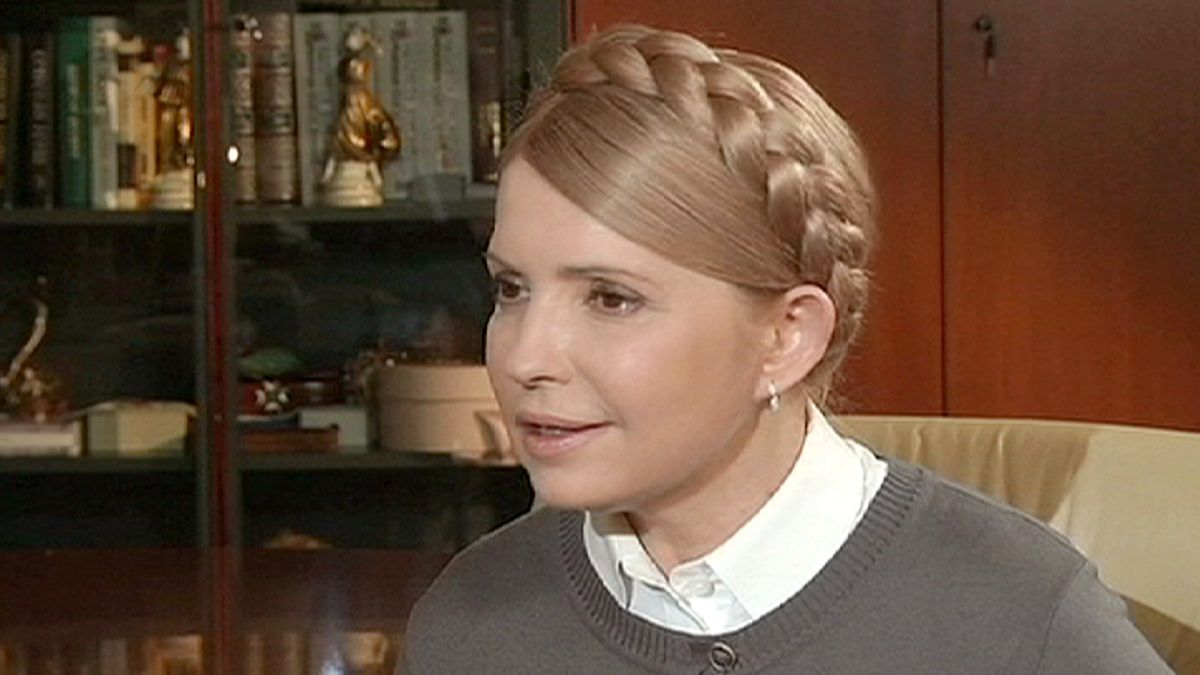Ukraine is moving towards crucial presidential elections on 25th May. The country’s former prime minister, Yulia Tymoshenko, is a candidate, but the so-called “chocolate king” Petro Poroshenko is leading the polls.
Yulia Tymoshenko was the symbol of the 2004 Orange Revolution and Ukraine’s prime minister until she lost the elections in 2010, after which she was jailed in 2011.
With Yanukovich’s fall from power she was released and is now campaigning in the south east of the country as well as courting Ukrainian nationalists.
Considering the political gulf between the two electorates, it is a huge political gamble which euronews spoke to her about.
euronews: “The situation for Ukraine is particularly difficult; there is huge tension with Russia, threat of war, or at least threat of civil war. What do you think about the latest statements from Moscow, especially from the Kremlin, about the Ukrainian situation?”
Yulia Tymoshenko: “Civil war in Ukraine is impossible, because Putin’s aggression has no support in the east and south of Ukraine. Only 18 percent of people in the east and south think that Donetsk, Luhansk and Kharkiv Oblast should separate from Ukraine and join Russia. This is a very small figure, almost nothing. So there is no large-scale separatism, no civil war. There is a de-facto undeclared war being waged by Putin against Ukraine, and this has to be stopped immediately.”
euronews: “Do you think that all EU member states are ready to go up against Russia, because a proportion of them have excellent relationships with Moscow, and in particular some EU heads of states have good personal relationships with Putin. So do you really think the EU would be ready to take steps against Russia?”
Tymoshenko: “I think the world has understood for a long time, that an authoritarian regime has been created in Russia, along with a closed economy. And rather unhealthy processes are being developed. The world has wondered how to normalise this situation. Putin has now given the world the opportunity to basically destroy the regime in Russia, which threatens world peace. Crimea and Ukraine are traps for Putin and he has walked into them. So I think the countdown has begun for the end of his regime.”
euronews: “Let’s talk now about the presidential election. The polls show that you are increasingly getting good results, but Poroshenko is still apparently ahead. Do you think that if this crisis results in postponing the election, this could be a good solution for you because then you might get even better results?”
Tymoshenko: “I am strongly against postponing the presidential elections to any other date. I think that the elections should take place on May 25, irrespective of anything – because for the country it is very important to get a legitimately elected president. I think it will be a strong stabilising factor for the situation in Ukraine and a factor which will stop the economic crisis. I am sure the new president will act firmly and consistently and will be able to change a lot. That’s how I will act.“
euronews: “I do remember after your release from jail when you went on stage in Maidan Square. Did you expect then such an outcome and such a huge political, and such a huge geo-political, crisis with Russia?”
Tymoshenko: “I couldn’t have predicted such a turn of events, because in 23 years of Independence nobody could have imagined that Russia would start a war against Ukraine. But the revolution succeeded, and it has given Ukraine real independence and real freedom. Putin couldn’t accept this revolution, he couldn’t come to terms with it. He got used to feeling that through a sort of the “fifth column”, dependent on him in the government of the country, he could have his policies carried out, and he had plans to expand his empire at the expense of Ukraine. The revolution upset these plans of his.”
euronews: “There is a big problem in this country, with the democratic and social representation of the eastern part of the country. Because the Party of Regions was a party and Yanukovich was the expression of this party. Without Yanukovich, the Party of Regions became a kind of lame duck, but the problem remains, doesn’t it?”
Tymoshenko: “You are right in that Ukrainians in the east and the south feel a certain lack of attention. They do not have politicians to rely on. That’s why over the past few weeks, I have spent all my time in the eastern regions, in Donetsk, in Luhansk, and also near the blocked buildings, in order to hear the Ukrainians in the east, to understand their messages to the Ukrainian government. I want to understand what they want, what kind of support they want from the new Ukrainian government. And we are ready to support them. I think this is one of the main issues today, and I devote a lot of time to it, despite campaigning for the elections. I think the time has come, as one of the world’s great presidents said, to heal the country’s wounds and to unite instead of fighting each other. To understand and to take steps towards each other is the way to return to peace.”
euronews: “You were one of the leaders of the Orange Revolution. So, for our viewers, not just in Ukraine, but in countries all over the world, could you explain the difference between the Orange Revolution and the events in Maidan Square?”
Tymoshenko: “The Orange Revolution was partly born in support of a presidential candidate, Viktor Yushchenko. So it was a revolution led and supported by politicians, and won by people. This revolution is totally different. This revolution took place without the support of politics or politicians. It was a revolution of leaders from civil society and those who followed them. It was a revolution of Ukrainians who wanted freedom, and this is a crucial difference.”


